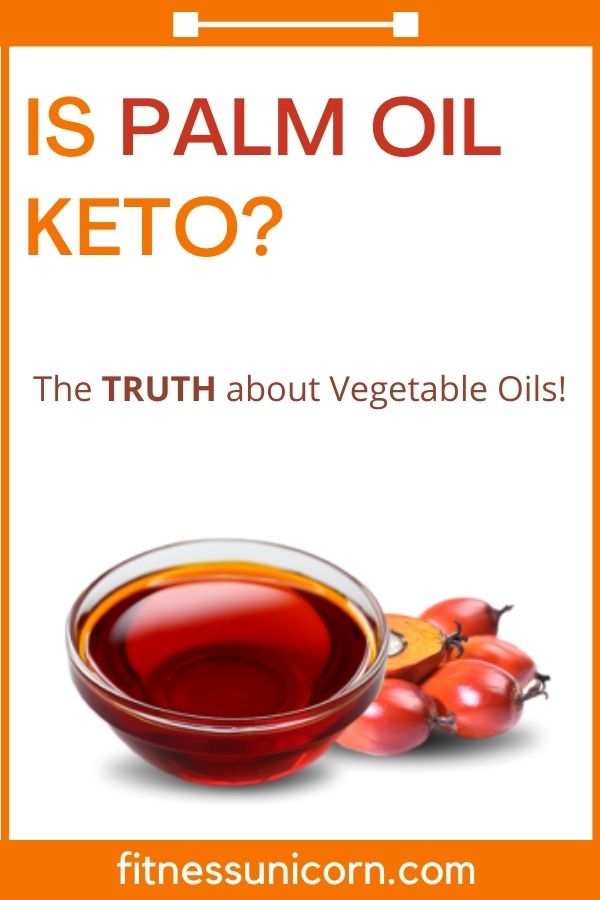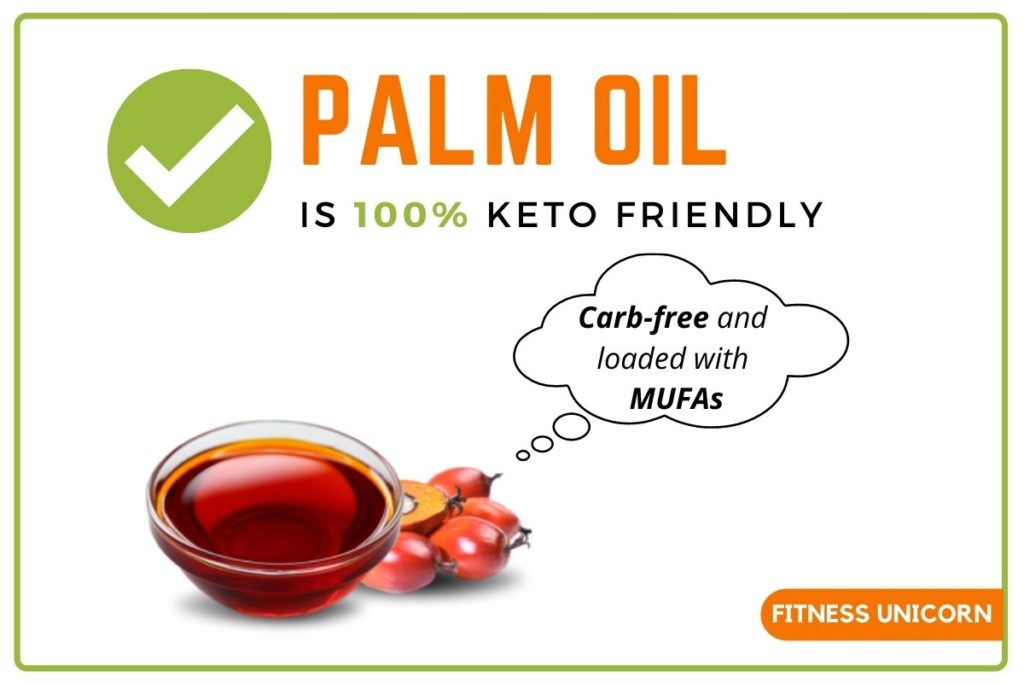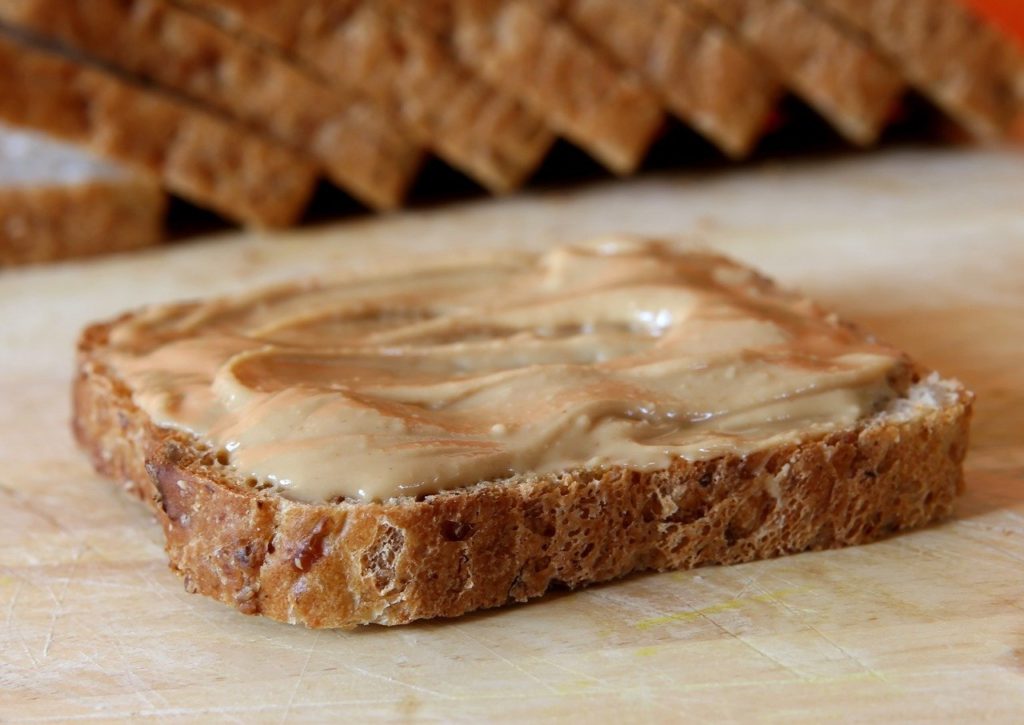Palm oil is often called an enemy to health and the environment! But what’s the complete truth? And is Palm oil keto?
Being a rich source of high-quality fats, palm oil seems a worthy contender for the keto diet.
In fact, it is the most consumed vegetable oil on earth!

Palm oil gets a bad rep because it’s often procured from unsustainable sources (destroying many forests along the way!)
On top of it, most of the marketed palm oil is highly refined, which makes it devoid of nutrition.
But not every container sold in the market is a “threat” to society. There are tons of varieties out there and you should know which one to pick!
In this article, we’ll see how palm oil fits into the keto diet, and how you can choose the right one!
Suggested: Can You Cheat on Keto?
Is Palm Oil Keto Friendly?
Palm oil is an excellent keto-friendly oil with ZERO carbs! It has a nutty flavor and a high smoke point of 450° F, which ensures proper frying.
A high smoke point of over 400° F avoids any burnt flavor in your food and prevents your kitchen from becoming a smokehouse!
Out of all the variants, the Unrefined Palm Oil (aka red palm oil) has the highest amount of monounsaturated fats and antioxidants.
Monounsaturated fats (MUFAs) are the undisputed king of all fats. Your focus on the keto diet shouldn’t be just fats, but quality fats!
MUFAs always have a higher smoke point than the PUFAs (polyunsaturated fats), and hence they don’t break down as easily.
They can boost weight loss, prevent inflammation, and even lower your risk for heart diseases!
Consuming too many saturated fats can clog your arteries, leading to blockages in the blood flow. Thankfully, diets rich in MUFAs can significantly lower your levels of bad cholesterol (LDL).
In one study, participants with a MUFA-rich diet showed up to 5% reduction in their blood cholesterol.

Red palm oil has a nutty flavor and it can definitely replace your current cooking oil! You can use it for frying, roasting, grilling, or pretty much any form of cooking!
Unfortunately, you can’t use palm oil for baking because its unique flavor can influence the taste!
I personally use it as cooking oil for most savory dishes (like a chili!).
Palm oil is a non-GMO oil loaded with nutrition! It is free from trans-fat and contains a healthy ratio of saturated and unsaturated fats.
And last but not the least, Palm Oil is also rich in Vitamin E Tocotrienols. They are a category of antioxidants that fight very specific free radicals within our bodies.
Vitamin E Tocotrienols provides you with a host of health benefits:
- Protects your brain from health conditions like dementia
- Improved heart health
- Lowers risk of various cancer by fighting off free radicals
- Studies of rats show that tocotrienol may slow down free radical-caused bone loss.
- Antioxidants can slow down or even reverse skin damage.
Also Read: Is Sesame Oil Keto?
Is Palm Oil Safe for Keto?
Not all fats are created equal! And this applies to palm oil as well!
There are two types of palm oil being sold in the market today:
- Crude Palm oil (aka Red Palm oil)
- Refined Palm oil
Crude Palm oil is red because it contains compounds called carotenoids. It is the same element that makes our carrots red!
As you can guess, crude palm oil is also the healthier one!
The Refined Palm oil, on the other hand, is highly processed and completely devoid of nutrition. It also loses its redness during the manufacturing process.
But let me tell you that the refined palm oil in itself isn’t unhealthy!
It gets a bad rep because it’s used in most packaged junk foods. Brands love it since it’s a cheap fat that greatly enhances food texture!

So why is palm oil linked with the obesity epidemic?
This is because refined palm oil is one of the most affordable oils for junk food manufacturers!
It helps cut down costs and flood the markets with highly processed, sugar-laden snacks.
Having said that, Red palm oil is still a very safe and excellent cooking oil for the keto diet!
More: Is Tahini Keto Friendly?
Why Go for Sustainable Palm Oil
Every day more and more junk food brands are entering the market.
Binge-watching Netflix is often accompanied by binge-eating crisps and other stuff!
This means the manufacturers now require more Palm oil than ever. That’s why big corporations are aggressively destroying huge chunks of land for palm oil cultivation!
The palm oil industry has ruined millions of acres of rainforest in countries like Indonesia and Malaysia.
The compounded effects of destroying so many rainforests can be disastrous!
In fact, these rainforests are the natural habitat of many rare species, including the Sumatran tiger and Sumatran orangutan.
Such rampant carelessness of the palm oil industry might even cause the extinction of their species!
It also poses many challenges that may come up as a disturbance in the ecological balance.
For example, such large-scale deforestation significantly increases carbon dioxide levels in the atmosphere.
Here’s why that happens:
- Palm oil companies burn down rainforests, releasing a lot of CO2 along the way.
- Since trees convert CO2 into oxygen, now there are fewer trees left for the job!
This further aggravates global warming and climate change.
So what’s the solution?
On a keto diet, always opt for organic red palm oil that is sustainably sourced.
By making this smart choice, you are not only doing yourself a favor but also contributing to the environment!
Organic palm oil farmers don’t ruin the rainforests, but instead, they take brownfields and turn them into richer soil.
They grow their produce on land which was otherwise uncultivable. Hence they not only save trees but in fact add more plantations which further boosts oxygen levels.
They also tie-up with organizations like World Wildlife Fund (WWF) to ensure healthy habitats for the animals nearby.
That’s why you should always buy sustainable red palm oil on keto!
Suggested: Are Tic Tacs Keto?
Palm Oil vs Palm Kernel Oil
Even though they come from the same parent, palm oil and palm kernel oil are chemically very different.
Palm oil is extracted from the Palm fruit whereas Palm kernel oil comes from the Palm seed.
The heart-healthy carotenoids in Palm oil give it a distinctive red color.
Palm oil is only used for edible purposes like cooking and frying. On the other hand, palm kernel oil is also commonly used in non-edible products like soaps and detergents.
The ratios of saturated and unsaturated fats also differ among the two:
- Palm oil has 50% saturated and 50% unsaturated fats
- Palm kernel oil has 80% saturated and only 20% unsaturated fats
There’s no good and bad when it comes to fats (except trans-fat, which you should completely avoid!)
Ideally, you should have a balance between the two of them. Saturated fat is the more common one that is present in almost all packaged foods.
Hence, regular palm oil (with more unsaturated fats) seems a better fit for the keto diet.
My Peanut Butter Contains Palm Oil
Palm oil itself has a mild nutty flavor and you can find it in most brands of peanut butter.
However, its main purpose is to prevent the natural separation of oils in the product.
While palm oil isn’t unhealthy, it’s a sign that there might be other chemicals and additives present in your peanut butter!
So you better read the nutrition labels carefully and scan for any suspicious items.

If it’s just the palm oil, there’s no reason to worry and you may enjoy the peanut butter guilt-free on keto!
Also, always opt for sustainably sourced products wherever possible.
We just discussed how palm oil is responsible for ruining huge rainforests. Being a smart consumer will help mother Earth in the long-run!
Recommended: Keto Peanut Butter Cookies
Vegetable Oils and Keto
Oil is a major game player in an all-fat diet!
Since oil is synonymous with fat, it is often used to amplify the fat content in keto recipes.
Vegetable oil is the most commonly sold cooking oil and you’ll find it being used in 9 out of 10 restaurants!
Pick up any random food at Walmart and there’s a very high chance you’ll spot vegetable oil as one of the ingredients.
Unfortunately, experts believe that most “commercial” vegetable oils including soybean oil and corn oil do you more harm than good.
What are Vegetable Oils?
Vegetable oil technically includes all those fats that come from plants.
But not all vegetable oils are created equal!
On one side, you have naturally extracted oils like Palm oil and avocado oil. And on the other hand, you’ll find commercially processed oils such as canola (rapeseed) or soybean oil.
In general, the term “vegetable oil” is used for oil extracted from industrial oilseed crops like soybean, corn, canola, cottonseed, sunflower, and safflower.
Here’s a shocking fact: More than 53% of vegetable oil consumed in the US is soybean oil! (Source: USDA)
So what’s wrong with soybean oil?
In order to answer this question, let’s throw some light on the three major kinds of fats:
- Saturated fats (SFAs): Once considered “unsafe” but now declared as a safe fat
- Monounsaturated fats (MUFAs): They are well-known for lowering blood pressure and blood glucose
- Polyunsaturated fats (PUFAs): PUFAs consist of Omega-6 and Omega-3 fatty acids, and that’s where you need to make the right choice!
Common vegetable oils like soybean oil and canola oil are loaded with Omega-6 fats, which is why you should avoid them.

Ideally, we should consume omega-6 and omega-3 fats in a 1:1 ratio.
But thanks to the ever-increasing trend of vegetable oils, an average American’s intake has reached up to 20:1!
And hence you should ALWAYS prefer omega-3 fats over omega-6.
Also, most vegetable oils include a PUFA called Linoleic Acid, which has some serious drawbacks:
- Linoleic acid may turn into arachidonic acid, leading to inflammation and slow metabolism (a major reason for weight gain!)
- It contains eicosanoids that trigger an immune response in your cells, creating low-level inflammation.
- At high cooking temperatures, Linoleic acid breaks down into harmful components, leading to various heart diseases.
So just like I said earlier, not all vegetable oils are created equal!
Red palm oil, coconut oil, avocado oil are excellent for frying as they have high smoke points. It means they won’t break down while you take your fried chicken to the heights of crispness.
What About Trans Fat?
There are two types of trans fats: Natural and Artificial
Hydrogenated vegetable oils fall under the category of artificial trans fat.
Once marketed as a “heart-healthy” product, they are now considered the worst type of fats on the planet!
That’s why you should say goodbye to hydrogenated vegetable oils.
Trans fat is known to increase your bad cholesterol (LDL), without increasing the good one (HDL).
It’s quite strange because most other fats increase your HDL and LDL simultaneously!
What’s more, a lot of studies have found a link between trans fats and heart disease.
These are some more high-quality keto-friendly fats similar to Palm oil:
- Coconut oil
- MCT oil
- Avocado oil
- Extra virgin olive oil
- Butter
- Ghee
- Cream cheese
- Heavy cream
Conclusion
Is Palm Oil Keto?
Palm oil is a carb-free keto-friendly oil! It is rich in monounsaturated fatty acids and antioxidants, making it a very healthy keto cooking oil.
Palm oil’s high smoke point makes it an ideal choice for grilling, frying, or sautéing your favorite keto meats!
However, I would never use it in sweets and baked goods due to its Paprika-like flavor.
